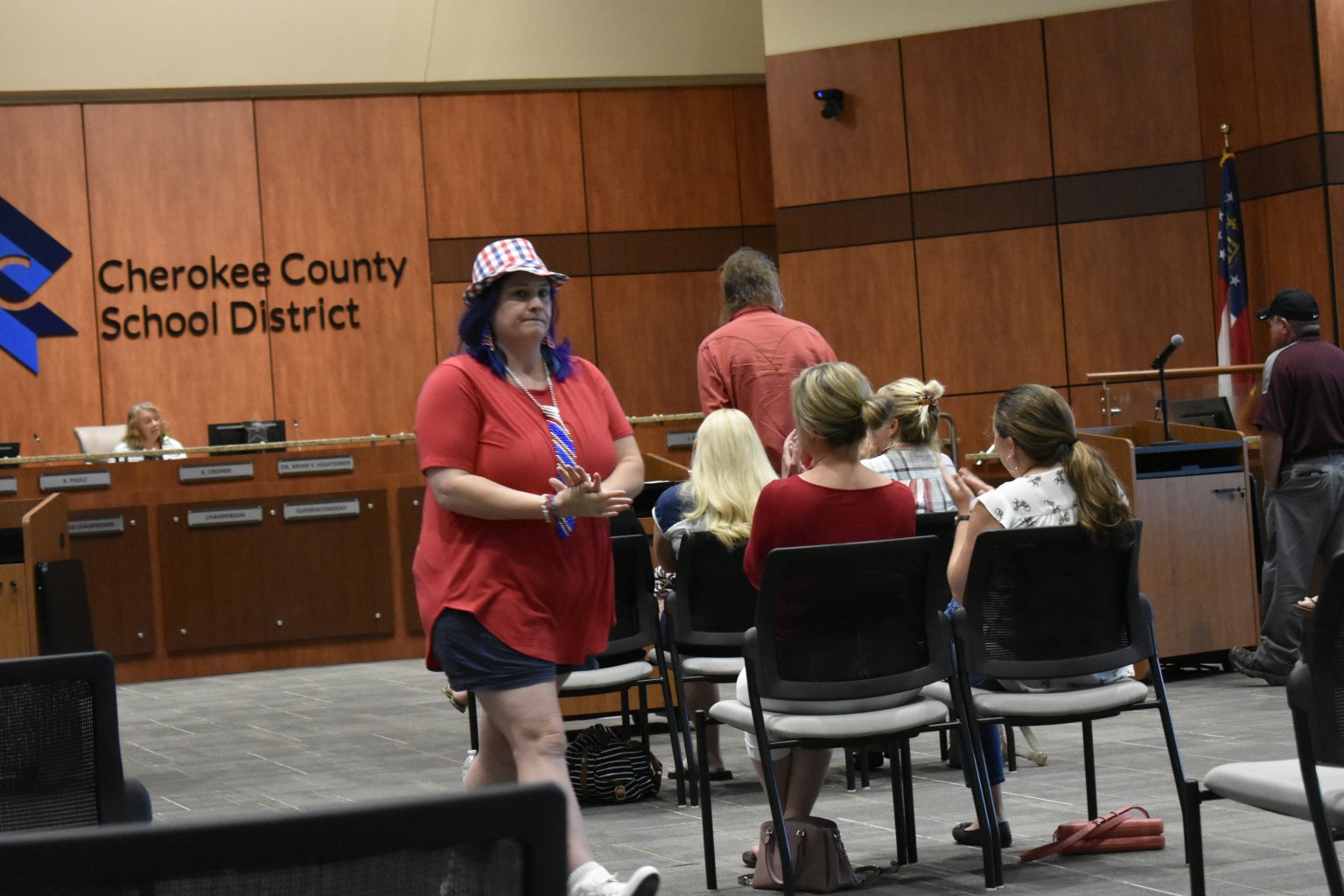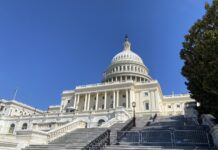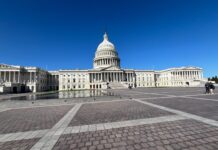
School districts around Georgia are announcing plans to reopen in a few weeks and many parents are agonizing over a choice between sending their children into close-quarters in-person classes as COVID-19 cases continue to rise, or — if their work schedule allows — keeping them at home to study online, potentially slowing their academic and social growth.
The debate played out in Canton Thursday night as a socially distanced crowd gathered to have their say when the Cherokee County Board of Education discussed plans to welcome back students early next month. Mask-wearing rules in the classroom were top of mind for much of the meeting, with one parent wondering if a medical exemption from wearing one would mark a child with a “red letter A.”
A similar struggle to get back to class in August is playing out in school board meetings across the state this month. Muscogee, Clarke and Cherokee counties plan to reopen Aug. 3, with the option of studying in-person or online. In Cherokee, parents who want to enroll their kids in online studying must do so by July 17 and commit to online learning for nine weeks for elementary school pupils or the full semester for middle and high school students.
Unlike other Georgia school districts, Cherokee County will not require students to wear face coverings, though masks or shields will be required for employees when social distancing is not possible.
The crowd Thursday was divided about evenly into the masked and unmasked. The pro-mask contingent, which included several teachers, argued for mandatory face coverings for students.
“Protective shields are being installed to protect office staff from visiting parents and to protect cafeteria staff from students as they pass through,” said middle school teacher Stephanie Weber. “The same contagions will come into our classrooms with every question a kid asks, with every conversation we have with students, with every song they sing, as well as the coughs and sneezes.”
Others said the plan is not realistic, relying too much on parents and children to do the right thing.
“In reality, parents are going to give their kids Motrin and send them to school,” said teacher Tiffany Robbins. “We know that, as teachers, in reality, when Johnny gets tired of doing the lesson, he’s going to cough on me, and he’s going to think it’s funny.”
Georgia schools are facing a budget shortfall of nearly $1 billion because of the virus. School districts are pledging to spend more on custodial staff and cleaning supplies, but those are sometimes hard to come by even in good times, Robbins said.
“We know and want and desire hand sanitizer in our classrooms, and soap in the bathrooms, but in reality, we know that sometimes, it takes 24 hours to get the soap in the bathroom,” she said. “We know that sometimes, we have to bring our own toilet paper from home for the teachers bathrooms. In reality, how safe are those classrooms going to be?”
Parents of children with compromised immune systems or who live with elderly family members who would likely not survive COVID-19 said the plan is too risky, and many parents said they have to work and cannot supervise their children’s learning online.
Some parents at the Canton meeting urged the board to use a hybrid plan with some students alternating between studying at home some days and attending in-person classes on others. This would reduce the number of kids in schools, but could also cost more to implement.
The only Georgia school district now planning to use a hybrid model is Clayton County, where students will come to class either Monday and Wednesday or Tuesday and Thursday, with all students learning online on Fridays.
The plan is just fine, said the mask-less members of the audience, who took to the podium to ask the board members to keep the mask mandate out.
Mask mandates are unconstitutional, some commenters said Thursday. Others, like community member Jen Thrasher, repeated debunked conspiracies about masks causing health problems.
“When you turn on your television and you see what they have to say, it scares you half to death,” she said. “It’s very scary. It’s not necessarily good to wear them for eight hours a day.”
Health experts recommend masks for children and adults.
But some people with medical issues cannot wear masks, and a mask mandate would make them targets for bullying, said mom Christine Gibson, who brought an American flag to the meeting and wore a red white and blue hat, earrings and tie when she spoke.
“For the children who cannot wear a mask, if you mandate them and say they don’t have to because they have medical notes, sure, you’ve just put a red letter A on my child, who has now just been shown to have a disability, who now is going to be bullied by other children, probably because he is now a child who is known to have disabilities,” she said.
Facemasks, social distancing and shuttered schools are the latest battlegrounds in the American culture war, with conservatives more likely to dismiss warnings about COVID-19 and favor prompt re-openings of schools and businesses.
President Donald Trump, who appears without a mask in public, weighed in on the school opening debate Wednesday, suggesting he may cut funding to schools in states that do not fully reopen.
“The Dems think it would be bad for them politically if U.S. schools open before the November Election, but is important for the children & families,” Trump wrote. “May cut off funding if not open!”
In a separate tweet, Trump also slammed reopening guidelines published by the Centers for Disease Control and Prevention, claiming the Atlanta-based health agency is demanding schools to do “very impractical things.”
Vice President Mike Pence and U.S. Secretary of Education Betsy DeVos later attempted to clarify the president’s comments.
“What the president was saying this morning is that if there are aspects of the CDC’s recommendations that are prescriptive, or that serve as a barrier to kids getting back to school, we want governors and local officials and education leaders to know that we’re here to work with them,” Pence said.
DeVos suggested in a Fox News interview Thursday that withheld funds could go toward a voucher program to pay for families to take their children elsewhere.
“If schools aren’t going to reopen, we’re not suggesting pulling funding from education, but instead, let families take that money and figure out where their kids can get educated, if their schools are going to refuse to open,” DeVos said.
Federal dollars made up about 6% of Georgia’s education budget for the 2019-2020 school year, said Georgia Budget and Policy Institute analyst Stephen Owens. The president would need the cooperation of Congress to redirect those funds.
“There’s a lot of misinformation about the power the federal government has,” Owens said. “It’s pretty fascinating to see. Last time, we had a Democratic administration use federal funding to change education policy with Race to the Top under President Obama, now we have a Republican administration trying to use federal funds to influence education policy.
“Both times, you’ll realize they do have a significant amount of sway, but as far as what is hard and fast written into law, the vast majority of your funding is still on the local and state level, and federal funding is more to just supplement the education of low income students, and that requires an act of Congress to significantly change,” he added.







